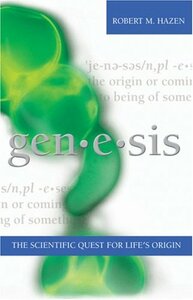Take a photo of a barcode or cover
informative
inspiring
medium-paced
This is an engrossing book about how scientists are trying to answer the question, how did life begin? Robert Hazen is an active scientist in the fields of mineralogy and astrobiology. However, most of the book is about chemistry, both inorganic and organic.
Emergence is a theme that extends throughout the book. Emergence is the development of complex patterns out of a simple background. Life is not just an emergent process--it is a hierarchy of multiple emergent processes that build one on top of another. Emergence is fundamental to the origin of life.
The most enjoyable aspect of this book is the descriptions of detective work in the laboratory. Some of the author's laboratory experiments are described in detail, and are at times engrossing. The author's writing style is a very nice blend of casual and informative, and sometimes humorous. For example, he writes,
One of the fascinating theories described in the book is the idea first advanced by Thomas Gold in 1977. Hydrocarbons exist in the earth's mantle, and since they are lighter than the surrounding rocks, they slowly rise toward the surface. They constantly refill petroleum reservoirs. Thus, oil is a renewable source of energy! Obviously, this is a controversial theory, but it is testable. The test was to drill an oil well in solid granite, where geologists would least expect oil to be found. Such an oil well was drilled, and just barely enough oil was found to keep the theory alive, but still unproven.
Another fascinating topic discussed in the book is the "chirality" of sugars and proteins in living organisms. Sugar molecules in living organisms are "right-handed," and amino acids are "left-handed". Exactly why and how life developed this way is a mystery. Pre-biotic processes should develop sugars and amino acids with a 50-50 mixture of left and right handedness. Why did life select only one of these? Hazen describes some experiments that he performed, trying to solve this mystery.

This is an enjoyable book to read--it has some technical jargon, but not too much. It is written authoritatively by a researcher who is deeply invested in the subject. The book contains a nice blend of theory, experiment, the stories of the scientists who are engaged in the field, and background on the many controversies that fill the topic. The field is still in its infancy--there is a long road ahead for understanding the origins of life.
Emergence is a theme that extends throughout the book. Emergence is the development of complex patterns out of a simple background. Life is not just an emergent process--it is a hierarchy of multiple emergent processes that build one on top of another. Emergence is fundamental to the origin of life.
The most enjoyable aspect of this book is the descriptions of detective work in the laboratory. Some of the author's laboratory experiments are described in detail, and are at times engrossing. The author's writing style is a very nice blend of casual and informative, and sometimes humorous. For example, he writes,
Hat banged away at the unwieldy wrench, making a horrendous racket as he tightened the nut just a bit more for safety. "It's always good to make a lot noise in the lab," he said. "That way the director will know you're working."There are lots of hypotheses and theories about the origin of life, and therefore lots of controversies. Many scientists have sorted themselves into various camps; those who believe in the "primordial soup" on the earth's surface, those who believe in life originating near super-heated vents on the ocean's bottom, or deep in the earth's interior, or even pre-biotic chemicals arriving on meteorites. There is also a lot of controversy among scientists concerning sort of a "chicken and the egg" problem; which came first, metabolism or genetics--or did they develop simultaneously?
One of the fascinating theories described in the book is the idea first advanced by Thomas Gold in 1977. Hydrocarbons exist in the earth's mantle, and since they are lighter than the surrounding rocks, they slowly rise toward the surface. They constantly refill petroleum reservoirs. Thus, oil is a renewable source of energy! Obviously, this is a controversial theory, but it is testable. The test was to drill an oil well in solid granite, where geologists would least expect oil to be found. Such an oil well was drilled, and just barely enough oil was found to keep the theory alive, but still unproven.
Another fascinating topic discussed in the book is the "chirality" of sugars and proteins in living organisms. Sugar molecules in living organisms are "right-handed," and amino acids are "left-handed". Exactly why and how life developed this way is a mystery. Pre-biotic processes should develop sugars and amino acids with a 50-50 mixture of left and right handedness. Why did life select only one of these? Hazen describes some experiments that he performed, trying to solve this mystery.

This is an enjoyable book to read--it has some technical jargon, but not too much. It is written authoritatively by a researcher who is deeply invested in the subject. The book contains a nice blend of theory, experiment, the stories of the scientists who are engaged in the field, and background on the many controversies that fill the topic. The field is still in its infancy--there is a long road ahead for understanding the origins of life.
